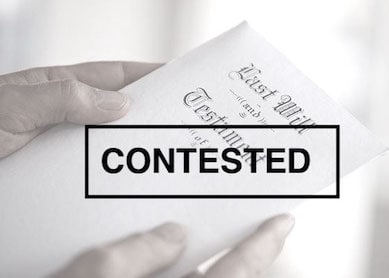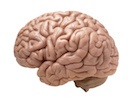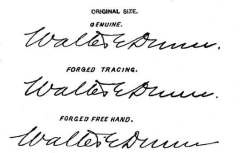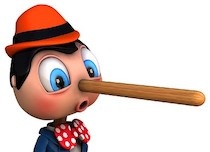
You are thinking of contesting a will in New York State, arguing to the court that the will is fatally defective should be set aside. To succeed in that undertaking, you will need to show that the testator did not have the mental capacity, the testator was unduly influenced or defrauded, the will was a forgery or the will was not made correctly. We will be getting into more than enough detail for you to do your research and explore your options. But never go into a will contest without experienced trial counsel – you will be crushed by the proponent's defense. This article is just a taste of the possible battle ahead.
1. The person who died was not well enough to make a will

Mental Incapacity – To show mental incapacity to make a will, we need to prove that the person who died did not understand one or more of the following:
- what they own
- who their relatives and friends are
- what is in their will.
Dementia Disorders – When contesting a will in New York State based on lack of mental capacity, you have a higher chance of success when the person who made the will suffered from a dementia disorder.
- Alzheimer's – this is the biggest cause of dementia. Early-onset can start as early as the age of 40 or 50, and progresses with age. It destroys a person's cognitive functioning and may cause them to lose the capacity to make a will.
- Vascular Dementia – often caused by a stroke, results from obstruction of blood flow to the brain
- Parkinson's Decease – degeneration of nerves in the brain.
- Frontotemporal Dementia – deterioration and shrinkage in front and side areas of the brain
- Dementia due to head injuries
- Dementia due to HIV or medications
Changes in memory and behavior in older adults usually point to dementia. The gradual cognitive decline caused by a degenerative condition eventually results in the loss of mental capacity required to make a will. The more dementia progresses, the harder it becomes for a person to make decisions. Therefore, the later the stage of Dementia, the more likely it is for the will challenge to succeed.
Mental Illness – Mental illness in and of itself does not mean that the decedent lacks capacity. In order to be successful in contesting a will in New York State, the objectant is going to have to show how the mental illness played a role in the making of the will. Some examples of mental illness that can impact the capacity to make a will are:
- Depression – The will-maker feels hopeless and passive and does not care what happens to their estate. The elderly often suffer from depression towards the ends of their lives. Family conflicts relating to inheritance only exacerbate their depression.
- Paranoia – The pervasive distrust of paranoia patients can make it easier to manipulate and "triangulate" them into excluding some people from their will.
- Bipolar – Bipolar patients experience mood swings. People who manipulate those patients exploit those mood swings in order to get the patient to change their will.
- Schizophrenia – Schizophrenia patients experience delusions and distorted reality. People who benefit from their will can take advantage of those mental deficiencies in order to manipulate the patient into making a will bequest. More about schizophrenia here.
Personality Disorders – personality disorders do not automatically mean that the decedent lacked capacity. But they can still make a big difference in contesting a will in New York State. For example, if the person who made the will had a "Cluster C" Dependent Personality Disorder, that person can be vulnerable to having "well-wishers" unduly influence them into making a will. When using personality disorders as a factor in challenging the will, we look to symptoms such as
- excessive dependence on others
- submissive behavior
- fear to have to provide self-care
- difficulty disagreeing with others and
- tolerance of poor or abusive treatment.
Weak Physical State – We challenge wills decedents who were in such a weak physical state that it can be said that their physical state adversely influenced their mental capacity.
Mind-Altering Pharmaceuticals – The fact that the decedent was taking potent mind-altering pharmaceuticals during the will execution can play a difference. When the decedent is in an altered state, they can have a significantly reduced capacity in understanding the facts of daily life, including the factors involved in making a will. Sedatives, antipsychotic and pain medications can push a person's mental state over the edge of capacity.
"Drifting in and Out" and "Lucid Moments" – Some people, as they get older, may drift in and out, sometimes lucid and sometimes not. If you are contesting a will in New York State, you will try to win by showing that the decedent was never lucid at all, or was only lucid on rare occasions and the time of the making of the will was not one of those occasions. Those defending the will are going to say that the time of will execution was a "lucid moment."
Some will contest lawyers and medical professionals hold the view that the "lucid moment" concept is out of date with the modern understanding of mental capacity. Their view is that since a person has no mental capacity, it doesn't "return" to them on some occasions. However, at this time, New York courts still consider "lucid moments," so this is an important factor to consider in New York will challenges.
2. Beneficiaries manipulated the person who died into making the will

Duress – On rare occasions, we see cases where someone forced or coerced the person who died into making the will. Read more about duress.
3. The will is a forgery

How People Forge Wills – To win based on forgery in New York, a will contestant needs to prove that someone forged the signature on a will, by either writing the signature themselves and saying that the person who died is the author, importing the signature from another document, or manipulating the text in some other way (by manipulating, we mean replacing the pages or changing the text).
Handwriting Expert – We win forger-based will contests by bringing a handwriting expert to present evidence of other handwriting samples of the deceased. The handwriting expert would compare the handwriting on the will and would say that it's not a close enough match. The handwriting expert would also determine if the handwriting on the will belongs to someone else, such as the person benefiting from the will.
4. The beneficiaries obtained the will by lying

Fraud in Factum – One type of fraud is misleading the decedent about the will itself. Beneficiaries slip a will under a guise of a different document or mischaracterize what is in the will and have the testator (maker of the will) unknowingly sign it.
Fraud in the Inducement – Another type of fraud is misleading the testator about circumstances outside of the will. The decedent can be fed misinformation about friends and relatives or other circumstances in their lives.
Unscrupulous individuals, especially psychopaths with narcissistic personalities, are very good at using manipulative tactics. Their favored ways of manipulating vulnerable seniors are
- triangulating – encouraging the victim's negative thoughts about a close person and
- gaslighting – providing a false view of reality to the victim
Opportunistic charlatans use those techniques to manipulate trusting older adults into leaving them an unfair share of the inheritance at the expense of the vulnerable person's family and true wishes.
5. The will was not made correctly

For a will to be valid, the people involved in the will execution need to follow New York's formal requirements. If they did not correctly execute the will, we could successfully contest that will, leading to the will being overturned and invalidated by the Surrogate's Court. In figuring out how to contest a will in NY, you will need to be familiar with the formal requirements of will execution.
The will need to meet the formal requirements, which are as follows:
- The person making the will has to sign the will (or direct someone else to sign their will in their presence)
- The person making the will has to sign at the end of the will, not in the middle of it.
- There needs to be two witnesses to the will
- The person making the will has to sign the will in the presence of each witness
- The person making the will must communicate to the witnesses that they are witnessing a will
- everyone has to complete the entire ceremony within 30 days of the testator's signature
The people involved have to follow New York execution formalities. Problems come up with wills when the person does not declare the document to be their will, or the witnesses are not there or not fully there. We can use those "hiccups" to litigate a successful will challenge in New York.
In the modern world where there is little place for ceremony, it is interesting to see how ceremony, procedure and something remarkably close to tradition or etiquette can make or break a legal document of utmost importance.
6. The maker revoked the will

A person who made a will can revoke that will. All they would have to do would be to physically destroy the will or cross out their signature.
If no one can find the will, we presume that the person who made the will revoked it, unless someone proves otherwise.
The person who made the will can also revoke it by making a new Will. If the decedent made another will, and he made that other will after the one you are challenging, the later will wins. If the later will is overturned, then you would either try to challenge the will before that one or leave it in place, depending on the older Will's impact on your share of the inheritance.
We can combine reasons (grounds) for a contesting a will in NY

When contesting a will in NY, rarely would you initially present a Will challenge with only one ground. In fact, in the beginning stages of a contesting a will, we often plead every possible ground for a New York will challenge, hoping that we find one that sticks at later stages of the case. This strategy is called "alternative pleading." If it looks like the decedent was not well enough to make a will, we would say that he was vulnerable to being misinformed or pressured to make a Will, due to his diminished mental state. We will also point out that whoever made the will did it in a hurry. There is less of a chance that whoever made the will had the time to evaluate the person who made it and did not have enough time to conduct the execution ceremony with all the required formalities.
It is true that in some will contest situations, an opportunity for a win can be spotted early on in the case. We can then proceed with a laser-sharp focus on a single issue. However, the most common strategy is still to plead every possible Will contest ground and see which one of them turns out to be more successful.
If you are involved in contesting a will in New York State, contact an estate attorney. You will describe the circumstances of the making of the will and air out the case. An estate attorney can determine whether the proposed objections have merit. Estate attorneys usually request a court-supervised examination of those involved before deciding whether it is worth your while to invest in a full-blown will contest.
We settle most many contests before trial. If a settlement is not possible, the sides exchange documents and information and ultimately proceed to trial, where the judge or the jury decides whether the will is valid or should be overturned.
Remedies for a Defective Will – When your lawyer is contesting a will in New York State, the court will decide at a trial whether a will is valid. The executor is not permitted to distribute the estate until the trial ends. If the court finds the will to be invalid, the court will do one or more of the following:
- Not admit the will
- Admit only a portion of the will
- Admit an earlier will in its place
- Not admit any of the wills, and distribute assets among the decedent's relatives as if there was no will.
| Deadline Alert: | Once the will is admitted to probate, it will be too late to challenge it. Act before the first hearing in the case. |
|---|
When it comes to making wills, unscrupulous people can take advantage of vulnerable individuals. Unscrupulous relatives, caretakers and so-called "friends" with ulterior motives prey on people who are physically disabled, cognitively impaired, isolated, confused and depressed. A victim of will fraud often loves, relies on, and fully trusts the person who misleads them. If you believe that someone took advantage of your loved one, you may be able to overturn their so-called "will." This is done with the help of a lawyer through a will contest in New York Surrogate's Court.
On the flip side, it does happen that people are wrongly accused of influencing a will-maker. Sometimes a will-maker wants to make a will a certain way on their own volition. This is why we have the court system and the New York attorneys. We practice will contests before the court every day. We strive to resolve those disagreements and let loved ones move on with their lives.
I have been contesting wills in New York State for more than a decade. If you are involved in one and are wondering how to contest a Will in New York State, give me a call. I will be happy to talk to you about it. My name is Albert Goodwin and you can call me at (212) 233-1233 or [email protected]. Thank you for reading my article and I look forward to speaking with you.













